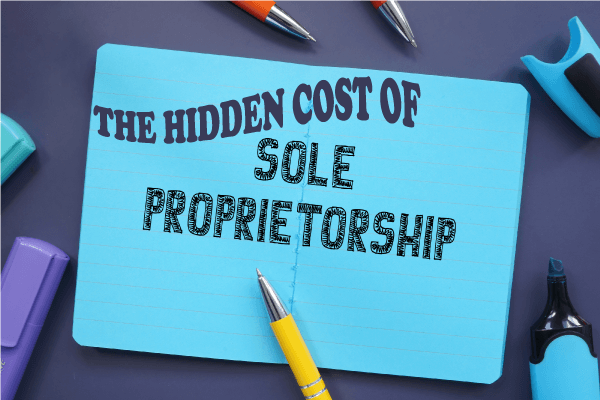Disadvantages & Hidden Costs of a Sole Proprietorship
Sure, there are no state filing fees, and no requirements like licenses or insurance, but the sole proprietorship is deceptive and has hidden costs and complications.
 It’s the simplest type of business—the sole proprietorship, a default classification for a business operated by someone who has decided not to form an official entity. If you know someone selling crafts on Etsy.com, for example, they are operating a sole proprietorship, if they have not formed an official company.
It’s the simplest type of business—the sole proprietorship, a default classification for a business operated by someone who has decided not to form an official entity. If you know someone selling crafts on Etsy.com, for example, they are operating a sole proprietorship, if they have not formed an official company.
Four Hidden Costs
of the Sole Proprietorship:
- Unlimited personal liability
This means you are personally liable for all debts of the company. This is the greatest risk of a sole proprietorship. Without having a separate entity for your tax and legal issues, a court is likely to see all of your assets and liabilities, including personal, non-business-related items, as a single group.
If you became the target of a lawsuit, a judge could easily rule that your personal assets and bank accounts be used to pay damages incurred as a result of your business activities. If you have outstanding tax obligations, the IRS or other agencies may pursue you, personally, rather than your business.
- Difficulty in raising investment capital
Elsewhere on this site, we discuss why investors prefer Delaware corporations over any other business entity. In short, it’s much more difficult to sell ownership in an LLC than in a corporation. And for a sole proprietorship, it’s basically impossible.
- Difficulty in getting a business loan or line of credit
As a sole proprietor, you’ll have to rely mainly on friends and family who already know and trust you. It is extremely unlikely you’ll find a venture capitalist willing to write a check to invest in a business that has no formal company encompassing it.
Similarly, credit lenders will not be eager to extend a line of credit to an individual for a business operation without a business entity.
- No business write-offs
Business write-offs lower the amount of taxable income you have at tax time, and this reduces the amount of tax you owe. Here is how it works: deduct the costs of running your business from your income. Make sure you have records to support your claims to the IRS and that the costs are ordinary and necessary. This is the way to benefit doubly, when you invest in your business. Electing not to do this may cost you a lot of money.
Because of these and other disadvantages, Harvard Business Services recommends all sole proprietors think about forming a Delaware company (Corporation or LLC) rather than operating a sole proprietorship. We are happy to answer questions for you and help you to compare business entities and determine which is appropriate for you.

*Disclaimer*: Harvard Business Services, Inc. is neither a law firm nor an accounting firm and, even in cases where the author is an attorney, or a tax professional, nothing in this article constitutes legal or tax advice. This article provides general commentary on, and analysis of, the subject addressed. We strongly advise that you consult an attorney or tax professional to receive legal or tax guidance tailored to your specific circumstances. Any action taken or not taken based on this article is at your own risk. If an article cites or provides a link to third-party sources or websites, Harvard Business Services, Inc. is not responsible for and makes no representations regarding such source’s content or accuracy. Opinions expressed in this article do not necessarily reflect those of Harvard Business Services, Inc.
There are 4 comments left for Disadvantages and Hidden Costs of the Sole Proprietorship
Legalo said: Friday, January 13, 2023Good information on hidden costs which we have to pay attention in advance. Thanks for the post.
HBS Staff replied: Friday, January 13, 2023Thank you for reading our post and glad you found it helpful.
Bren said: Tuesday, April 20, 2021I am sorry to bother you, but hoping for some clarification. I considered forming an LLC for these reasons, but I don't think I'm there yet... I wanted to pilot a dog walking business in a different state this summer from where I live, a beach town in NJ. It's just me, alone for now. I guess I would need to register as a sole proprietorship/DBA at the least for now to get a EIN# and separate bank account...? I don't know how it will turn out yet, nor if I'll be in the same state continuing to dog walk in the fall, I may want to continue but in my current home state... Hence, unsure of which state to register in as a sole proprietor, my home state now PA or summer NJ...?
HBS Staff replied: Tuesday, April 20, 2021Hello Bren,
Thank you for reading our blog. We are happy to help answer any questions before, during and after the incorporation process. One of our Sales Executives will reach out to discuss your inquiry more.
Phillip Battle said: Friday, April 16, 2021I have my EIN#. I need a Business license
HBS Staff replied: Friday, April 16, 2021Hello Phillip,
The buisness license is obtained through the County and State in which you are physically doing business in. If we can help answer any questions please reach out to us at 302-645-7400.
rob wert said: Friday, November 29, 2019hi is Sole Proprietorship a good way to go for a bank account, to ensure the FDIC is ensuring my money? and do i even have to have an active company to do that?
HBS Staff replied: Tuesday, December 3, 2019Unfortunately, we cannot advise on financial matters. This question would be better suited for an accountant. However, we often find that the disadvantages of a sole proprietorship outweigh any potential advantages.
